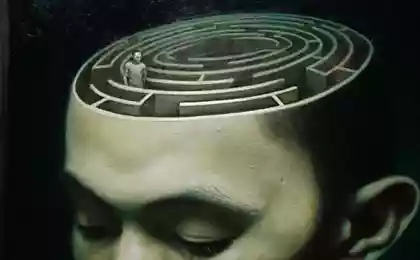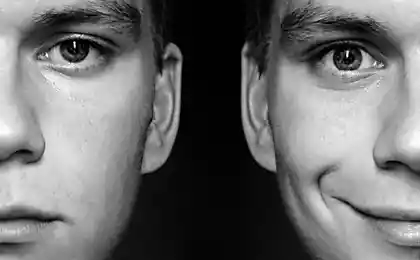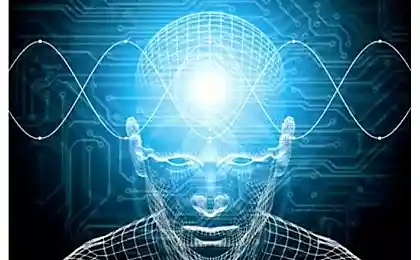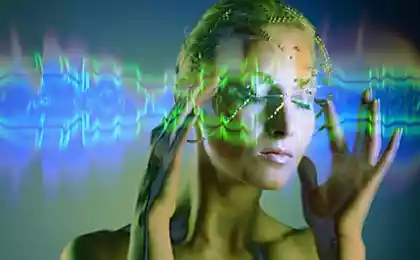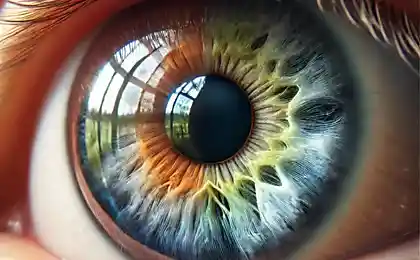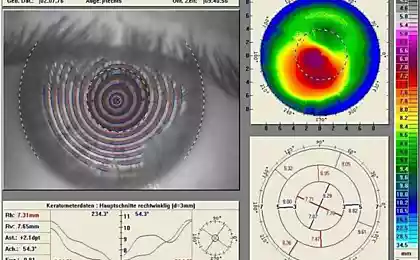465
Involuntary traitors: how eyes betray our thoughts
Sometimes it is said that the eyes - a mirror of the soul, revealing deep emotions that we want to hide. Although modern science and deny the existence of the soul, it suggests that this old adage is a grain of truth: it turns out, his eyes not only reflect what is going on in your head, but also can affect the way we remember and make decisions. < Website published a great article that explains how it happens.
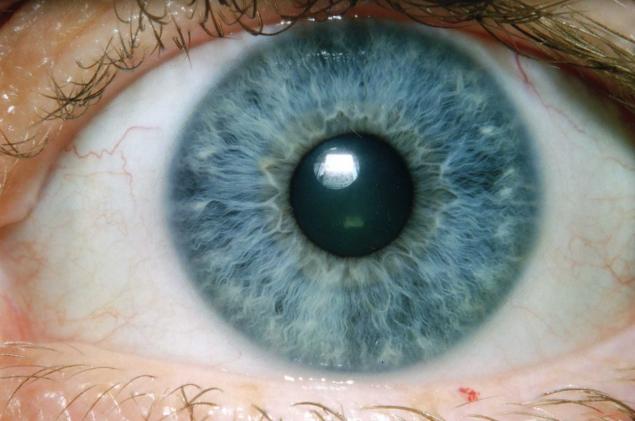
Our eyes are constantly moving, and although some of these movements, we consciously control, most unconsciously done. For example, while reading we make a series of very fast movements eye called saccades, which are fixed one word after another. When we enter the room, we do extensive saccades, looking around. Also, the eyes move involuntarily when we go to compensate for movements of the head and stabilizing our opinion. And of course, his eyes running back and forth with great speed during REM sleep (REM).
As it is now clear that some of these movements may reveal our thought process. A study published last year showed that pupil dilation is associated with a degree of uncertainty in decision-making: If a person is not sure of his decision, he feels an increased arousal, whereby pupils dilate You can even try to predict. what will be the solution: one group of researchers found that watching dilated pupils, can be seen when the man used to say "no", is trying to take the difficult decision to say "yes»
.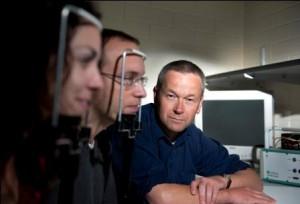
Also, the eyes can give out, how many people put forth. Lotsher Tobias and his colleagues from the University of Zurich selected 12 volunteers and monitored the movements of their eyes, asking randomly call 40 numbers. They found that the direction and size of the pupils participating accurately showed more or less than the previous number will be mentioned. < Looking volunteers shifted up and right before you call the greater number, and down and to the left, before the called number is less. The greater the movement, the greater the difference between the numbers provided.
«When people look at something with what has already seen before, their eyes are often attracted to the previously seen, even if the conscious memories did not survive» Unfortunately, the study does not explain what comes first: the thought of a particular also cause changes in the position of the eyes, or the position of the eye affects the mental activity. In 2013, Swedish researchers published evidence that the second option is more likely: eye movements can affect the memory. As a result of research conducted with the participation of students, they found that being distracted from the object in question and quickly scanning the surroundings, more qualitative subjects coped with the tasks on memorization. Perhaps this is because the eye movements help us to remember spatial relationships between objects in the environment that existed at the time of encoding information.
These eye movements can occur subconsciously. «< When people look at something with what has already seen before, their eyes are often attracted to the previously seen, even if not conscious memories preserved », - says Roger Johansson, who led the research
<. br> Watch the eyes not long ago, researchers found an unpleasant fact: tracking the direction of gaze can be consciously used to influence the moral side of our decisions
. The researchers asked participants were complex moral questions, such as "may it be justified murder", and shown on-screen computer possible answers ( "sometimes" or "can never"). By removing the answer on which of the test eyes lingered longest, the researchers were able to push the parties to a particular, desired them to an embodiment.
"We did not give them more information, - said neuroscientist Daniel Richardson, lead author of the study, - We just watched closely for their own decision-making processes and interrupt them just at the right moment. We forced them to change their opinion properly capture the moment decision
solutions. »
<« Good seller is able to determine the exact moment when you hesitate, trying to make a decision, and the time to offer you a discount » Richardson adds, that some people, especially from the sphere of sales, may have an idea about it, and use their knowledge for the clients beliefs. "We think we know how to convince people - just good speakers, but maybe they intuitively monitor the process of making your opponent solutions, - he says - for example, a good seller is able to determine the exact moment when you hesitate, trying to make a decision, and in time offer
you a discount. " The ubiquity of tracking view applications for smart phones and other portable devices increases the possibility of remote influence on the decision-making process. "If you make a purchase online, they are able to influence your decision by offering free delivery at a time when your mind lingers on a particular commodity».
< In this way, eye movement can reflect and affect memory and decision making, and give our thoughts and desires This knowledge is, on the one hand, gives room for self-improvement, the other -. tells manipulators, what more they could get us in the head and podёrgat the strings of our solutions .
"His eyes - how the windows in our thought processes, and we are not able to assess how much information can be obtained from them, - says Richardson. - They can tell about a person, even then, what he does not want to admit to himself, such as implicit racial or other bias. Track view, from the point of view of high technology, it may be useful, but it can deal with not only inzherenry and psychologists, but also
crooks. " via www.bbc.com/future/story/20150521-how-the-eyes-betray-your-thoughts?ocid=global_future_rss

Our eyes are constantly moving, and although some of these movements, we consciously control, most unconsciously done. For example, while reading we make a series of very fast movements eye called saccades, which are fixed one word after another. When we enter the room, we do extensive saccades, looking around. Also, the eyes move involuntarily when we go to compensate for movements of the head and stabilizing our opinion. And of course, his eyes running back and forth with great speed during REM sleep (REM).
As it is now clear that some of these movements may reveal our thought process. A study published last year showed that pupil dilation is associated with a degree of uncertainty in decision-making: If a person is not sure of his decision, he feels an increased arousal, whereby pupils dilate You can even try to predict. what will be the solution: one group of researchers found that watching dilated pupils, can be seen when the man used to say "no", is trying to take the difficult decision to say "yes»
.

Also, the eyes can give out, how many people put forth. Lotsher Tobias and his colleagues from the University of Zurich selected 12 volunteers and monitored the movements of their eyes, asking randomly call 40 numbers. They found that the direction and size of the pupils participating accurately showed more or less than the previous number will be mentioned. < Looking volunteers shifted up and right before you call the greater number, and down and to the left, before the called number is less. The greater the movement, the greater the difference between the numbers provided.
«When people look at something with what has already seen before, their eyes are often attracted to the previously seen, even if the conscious memories did not survive» Unfortunately, the study does not explain what comes first: the thought of a particular also cause changes in the position of the eyes, or the position of the eye affects the mental activity. In 2013, Swedish researchers published evidence that the second option is more likely: eye movements can affect the memory. As a result of research conducted with the participation of students, they found that being distracted from the object in question and quickly scanning the surroundings, more qualitative subjects coped with the tasks on memorization. Perhaps this is because the eye movements help us to remember spatial relationships between objects in the environment that existed at the time of encoding information.
These eye movements can occur subconsciously. «< When people look at something with what has already seen before, their eyes are often attracted to the previously seen, even if not conscious memories preserved », - says Roger Johansson, who led the research
<. br> Watch the eyes not long ago, researchers found an unpleasant fact: tracking the direction of gaze can be consciously used to influence the moral side of our decisions
. The researchers asked participants were complex moral questions, such as "may it be justified murder", and shown on-screen computer possible answers ( "sometimes" or "can never"). By removing the answer on which of the test eyes lingered longest, the researchers were able to push the parties to a particular, desired them to an embodiment.
"We did not give them more information, - said neuroscientist Daniel Richardson, lead author of the study, - We just watched closely for their own decision-making processes and interrupt them just at the right moment. We forced them to change their opinion properly capture the moment decision
solutions. »
<« Good seller is able to determine the exact moment when you hesitate, trying to make a decision, and the time to offer you a discount » Richardson adds, that some people, especially from the sphere of sales, may have an idea about it, and use their knowledge for the clients beliefs. "We think we know how to convince people - just good speakers, but maybe they intuitively monitor the process of making your opponent solutions, - he says - for example, a good seller is able to determine the exact moment when you hesitate, trying to make a decision, and in time offer
you a discount. " The ubiquity of tracking view applications for smart phones and other portable devices increases the possibility of remote influence on the decision-making process. "If you make a purchase online, they are able to influence your decision by offering free delivery at a time when your mind lingers on a particular commodity».
< In this way, eye movement can reflect and affect memory and decision making, and give our thoughts and desires This knowledge is, on the one hand, gives room for self-improvement, the other -. tells manipulators, what more they could get us in the head and podёrgat the strings of our solutions .
"His eyes - how the windows in our thought processes, and we are not able to assess how much information can be obtained from them, - says Richardson. - They can tell about a person, even then, what he does not want to admit to himself, such as implicit racial or other bias. Track view, from the point of view of high technology, it may be useful, but it can deal with not only inzherenry and psychologists, but also
crooks. " via www.bbc.com/future/story/20150521-how-the-eyes-betray-your-thoughts?ocid=global_future_rss
These 2 things are important to know for anyone with home plastic windows!
These guys are just mocking glamorous girls with photos!



